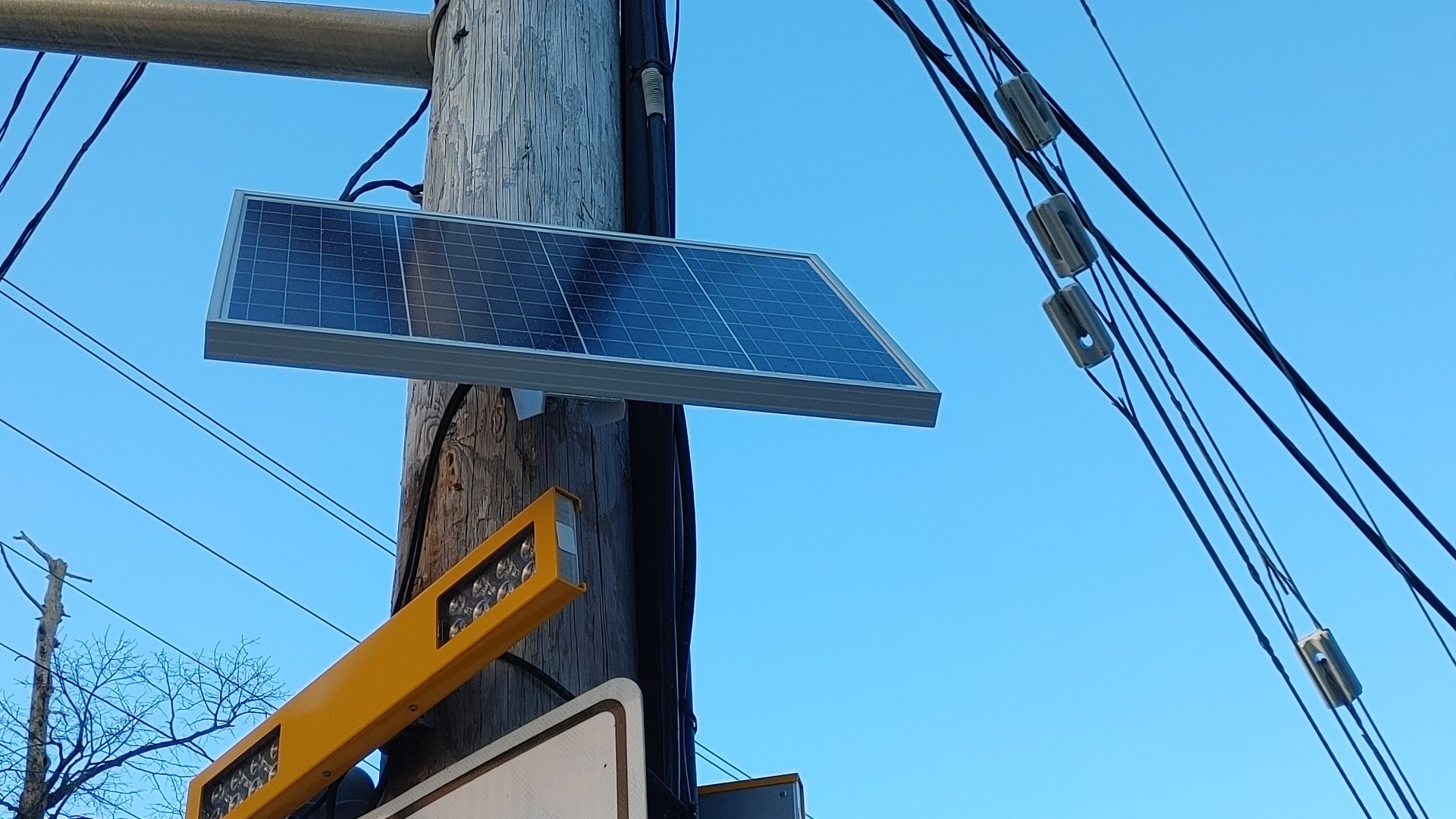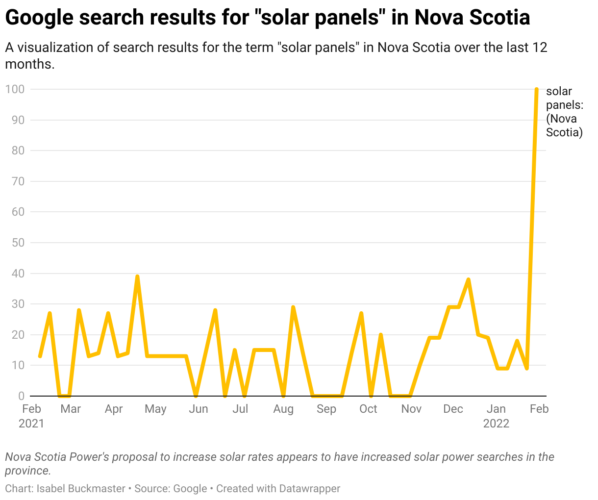Got questions about solar? We have answers
A guide for homeowners who want to tap into the sun's power

caption
A solar panel on South street that powers the pedestrian crosswalks.The recent controversy over Nova Scotia Power’s unpopular proposal to charge a fee to net-metered solar installations revealed broad support for solar power. The provincial government acted to protect those who had installed the cells and preserve a growing industry by halting the proposal in its tracks.
It might also have generated even more interest in solar power. Google search results for “solar panels,” which spiked in February, show that the dispute may have piqued Nova Scotians’ interest in the industry.
This follows Premier Tim Houston’s promise to enhance commercial and community solar programs to make solar more accessible.
“I think (the premier’s interference) will stabilize the industry and will help it grow,” said John Jennex, the owner of Ascent Solar Technologies, a local solar installation company. Related stories
“Now that the province knows that there’s a future for their investment in solar, I think we’ll see it continue to boom.”
According to Nova Scotia Power, more than 30 per cent of the province’s energy comes from renewable sources but where wind was popular, solar generation has gained ground through net metering programs and other pilot projects.
Here are answers to some of the burning questions about the solar industry in Nova Scotia.

caption
A line graph showing search results for “solar panels” in the last 12 months in Nova Scotia. Searches have increased since Nova Scotia Power’s net metering proposal.Solar panel efficiency
To gather light, solar projects have two types of mounts; fixed or tracking. A fixed mount never changes, whereas a tracking mount follows the sun and can increase electricity generated (but at a higher cost). Most solar panels convert between 11 to 15 per cent of sunlight into usable electricity.
The Economics of Solar Power in Canada (ESPC) is a government-funded dataset that found the competitiveness of solar generation in a province often depends more on local electricity prices than it does on sunlight.
Currently, commercial solar breakevens are less than commercial electricity prices in most places in Nova Scotia. This means that businesses can expect to save money by installing solar.
Provincial tariffs, fees that electricity generators pay, are also a barrier to installing solar power in Nova Scotia because they cause an owner’s break-even point to be above electricity prices.
ESPC determined that if electricity were to be purchased by a third party, Nova Scotia currently has several locations where “breakevens are below electricity prices when earning “time of day” premiums.”
How much do solar panels cost?
Converting to solar is an investment; it can run anywhere from $10,000 to $50,000 in Nova Scotia, including installation. Cost is calculated using a formula that compares the size of the system needed with early energy use and annual sunlight hours.
“What other jurisdictions have done is something called performance-based regulation,” said Brendan Haley, the policy director for Efficiency Canada, a research and advocacy organization.
Performance-based regulation provides incentives to ensure utilities follow through on planned proposals or encourage them in the direction the regulator prefers. In Nova Scotia, the regulator is the Utility and Review Board, which holds public hearings into Nova Scotia Power’s rate hike applications.
“If Nova Scotia Power is going to receive some incentive, shouldn’t the customers also receive an incentive for the stuff we really want in a low carbon future?” said Haley.
Additional Value
Studies have shown that for each kilowatt of solar installed, a home’s value could increase up to $6,000. Solar panels can add up to three to four per cent to the value of your home.
“I think (Nova Scotia Power’s proposal) opened people’s eyes and we will continue to look for allies and people to join us in some alternatives for generating energy that is going to be fairer to communities and bring more benefits to smaller players,” said Gretchen Fitzgerald, national programs director at Sierra Club Canada, an environmental advocacy group.
“This really has revealed that there is something wrong with how Nova Scotia Power is regulated, and it needs to be fixed and we’ll be looking to political leaders to create the space for different types of power generation,” she said.
Solar panels can also be used to heat inground pools. Some local campgrounds have converted to solar to provide power to recreational vehicles and trailers.
Rebates
According to the ESPC, rebate programs available in Nova Scotia are some of the best in the country, with residential solar “expected to save homeowners money almost everywhere.”
Solar-powered Nova Scotians can earn back their investment through the Solar Homes Program, which provides homeowners $0.60 per kilowatt-hour for residential solar power installations.
To fully expense their system, businesses can use the federal tax provision for clean energy equipment and take advantage of Nova Scotia Power’s shared solar program. Introduced in April 2021, the program allows any third party to generate electricity from solar for customers’ use and then sell it back to the power company at a fixed rate.
Halifax also offers a program called Solar City, which provides property owners with a loan to pay for the project. The money is repaid over 10 years at a fixed interest rate of 4.75 per cent.
There are several companies available across the province, all at similar price points, that offer solar panel installation. Converting to solar can also mean one or two panels and the costs reflect that. However, some businesses aren’t compatible with the rebate programs.
Can I buy solar panels second hand?
Yes. Where new solar panels are priced based on the energy they produce, used solar panels are the wild west.
On Kijiji, prices range significantly from half-price to above market value. Typically new panels range from $2.43 to $2.68/kW, not including installation fees.
There are more solar panels available on Facebook Marketplace but the price range is similar, with clearance prices and market value.
Can you install your own solar panels?
Yes. All you need are lag bolts, a drill, sunscreen, and a spare weekend on the roof (or the ground, depending on your choice of panels,) for installation. You will need to hire an electrician and may need to consult with the power company for final hookups.
CAUTION: Nova Scotia is the only jurisdiction in Canada to mandate two inspections prior to installation and electrical permit fees are higher than in most provinces.
Zoning, solar access and easement policies, and land-use bylaws to accommodate various sized solar systems including battery storage and ground mounts are limited.
If you’re confused about what you need to get started, the PV watts calculator is used by most solar installation companies to size systems based on house location and position, as well as roof angle.


J
Jacques Côté